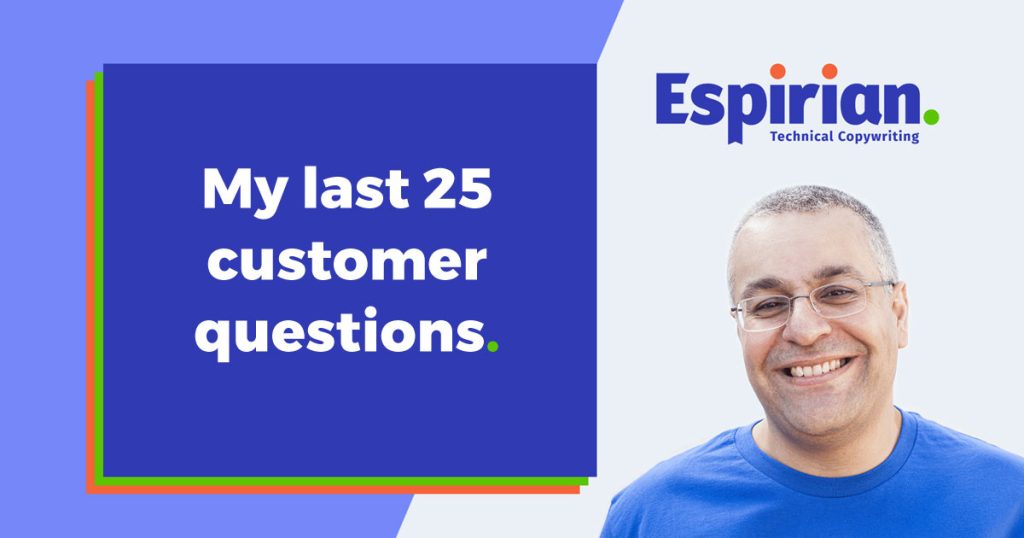
I receive a lot of email queries through my website, so I thought I’d share my last 25 questions along with some answers.
1. Do you produce developer documentation?
I can do, yes, but I find working with Application Programming Interface (API) documents and similar content to be quite dry and boring. I prefer assignments that have a lighter tone. That said, if you want developer documents that are simple, clear and that have a touch of personality about them, I might well be your man.
2. Is your focus on a B2C audience?
For the uninitiated, here are a couple of definitions:
- B2B – business to business
- B2C – business to consumer
Traditionally, people have thought of these as separate streams, because surely writing for a business would be different from writing directly for a consumer.
I think opinions are changing now, and writers find themselves producing H2H content: human to human. Sounds a bit cheesy but it’s true. As any marketer will tell you, people do business with people. We have to write in a way that will appeal to real people.
Stuffy business writing isn’t my thing. I produce H2H content. If that’s what you want, you’re in the right place.
3. Have you written documentation for a developer-to-developer audience?
No. Which isn’t to say I couldn’t do it, but I think doing so would require a lot of research. Of course, research is a big part of any technical writing project.
4. Could you write a regular ‘business technical writing’ blog?
Yes, so long as there’s a suitable retainer agreement in place. For repeat work, I usually charge in the region of £150–£200+VAT per blog post.
5. Could you write a blog on protecting your computer?
Already done! Here’s an online guide I co-authored for a client:
Beginner’s Guide to Internet Safety: 14 Tips to Avoid Fraud
6. Do you need a voiceover artist for your screencast videos?
No thanks. I had a lovely approach about this from Ulf Bjorklund, so I decided to mention him here in case anyone does need a voiceover artist.
I use my own voice for my screencasts. I’m not exactly Morgan Freeman, but I get the job done.
7. Could I ask you about using [some product] as a technical writing tool?
I often receive survey-type questions like this, but rarely have time to provide an adequate answer.
I use MadCap Flare for most of my technical writing work.
8. Could you write generic blogs and in-depth technical blogs about load balancing?
Yes, if I’m given the time and financial compensation for doing the necessary research. It’s all about the research!
9. Could we feature you in a story about the techie things you do to help your colleagues?
Yes, why not? I’ve created an Extra extra page on my site to cover my interviews and appearances.
10. Could you give me a technical writing job?
Probably not. I’m a one-man business. At best, I’ll keep your details on record and drop you a line if a big collaborative project comes along.
I’ll need to be convinced of your skills before recommending you to anyone – it’s my reputation on the line, after all.
11. Could you share our article on your blog?
No, but sometimes I’ll share good content on social media, e.g. 100 editing and proofreading tips for writers.
I’m not looking to receive or host guest blog submissions from other writers and organisations.
12. Could you check and correct my writing in my emails, letters and webpages on an annual retainer agreement?
I’m happy to edit text but retainer agreements for this sort of thing are hard to price. And when it comes to annual retainer agreements, well, that sounds almost impossible to price. I’d rather start with editing a few individual pieces and see how that goes before committing to anything more long term.
13. Could you nominate an Unsung Hero of Publishing for 2017?
Having been given this award in 2016, I was asked to nominate someone for the 2017 award. So I did. I think I’m probably meant to keep my nomination a secret.
14. Could you write some text for the website of my new business?
Yes! That’s one of my most common requests. Take a look at the ‘Key factors’ section on my Pricing page and then get in touch.
15. Could you proofread a document for the European Commission?
Yes! I tend not to take on too many proofreading projects, though, as they’re not as well rewarded as writing. Still, if it’s an interesting subject or a really cool client, I’m in.
16. Could you review my website and let me know how to improve it?
Yes, though this isn’t a core part of my business. You can see a sample of the sort of review I’d do by looking at this review for KT Editing Services. I’d usually charge around £150+VAT for something like this.
Did you know you can get a free 5-minute review of your site by submitting your website URL to the Peek UserTesting site? It’s a cool service that I’ve used several times. Definitely worth a try, and certainly something to do before paying me or anyone else to do a more in-depth review.
17. Could you edit a business proposal and then turn it into a designed PDF?
Yes, I can turn edited text into a PDF layout, using either Word or InDesign. If you want something more fancy and you have the budget, I could call in one of my design colleagues to help take your visuals up a notch.
18. Could you rewrite an online user manual?
Yes. Drop me a line to discuss the details.
19. Could you turn these instructions sent from our manufacturer in China into something readable?
Yes, though often this involves more than simply editing a set of poorly translated documents. The best approach would be for me to understand how the product works by using it myself and then rewriting the instructions in terms that will suit the intended audience.
20. We need more than one technical writer. Could you recommend others to work on this job with you?
Yes. I know a couple of good technical writers who I’d be happy to partner with on larger projects. Some people think it’s scary to recognise and celebrate the skills of others who work in the same field. I try not to be so insecure.
Here’s an example: Craig Wright. He’s a good guy and works on a Mac, like me. Check him out.
21. How do I get started as a copywriter/editor/proofreader?
I receive lots of emails like this, so I’ve written a post for new copywriters: Read this before asking me how to get copywriting work.
And as for editing and proofreading, there’s a wealth of information in the FAQs on the SfEP website (I helped put these together as part of my role as the Society’s internet director).
22. Could you work with us to produce a range of documentation for the next 3–6 months?
Possibly. I do wonder about such potentially massive briefs: they don’t usually end up leading to paid work, often because the client hasn’t quite thought through their requirements before getting in touch. Just note that if you want to hire a freelancer on a big project that would be likely to reduce their chances of working for other clients, you’ll probably have to pay a pretty penny.
Freelancers also have to be careful when agreeing to take on work like this, because exclusive work arrangements could be seen by HMRC as being the same as being an employee of the client (with the tax and other considerations that go along with such a change of status).
23. How much do you charge for writing technical material?
Take a look at my Pricing page.
24. How much does it cost to create a 10-minute video to show how our product works?
Even though my Pricing page gives my day rates, it’s hard to put a price on something like this, as it depends on the complexity of the product being demonstrated. On a good day, it can take 60 minutes to produce 1 usable minute of video. But a more challenging brief could push that 60:1 ratio up to 120:1 or worse – and obviously that’s going to affect the price.
You can find out more about my screencasting process here: Introduction to screencasts.
25. Could you show an example of a datasheet or user manual where you’ve done a light edit?
That’s a tough one. I don’t have a formal portfolio on my site because no sensible client will want to share ‘before and after’ versions of their content (it doesn’t look good to expose your errors to the public!).
I sometimes try to get around this by offering to work on a small part of a client’s document, to show them the sorts of changes I’d make. This still amounts to a chargeable piece of work, but it’s much less of a risk for the client to try out my service like this before they commit the budget necessary for a larger project.
Over to you
If you’re someone looking for a writer, have I answered your questions? If not, drop me a line and let’s talk. And if you’re a freelance service provider yourself, are you sent lots of questions by your potential clients? How do you deal with them? If you have an FAQs page on your site, does anyone look at them? Let me know by leaving a comment below or by catching up with me on Twitter. I’d love to hear from you.


